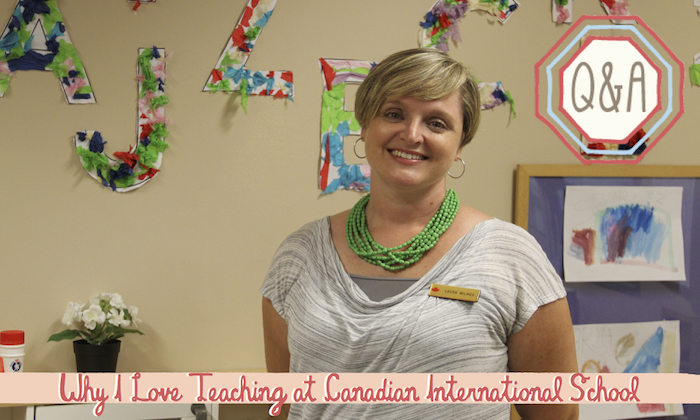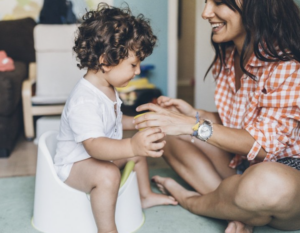
Find out why Laura Wilmes loves teaching at Canadian International School!
Teacher: Laura Wilmes
Teaches: Senior Kindergarten
What is your background and training?
I have an undergraduate degree from Western Carolina University in the U.S. in Child Development and Family Relations. I studied Early Childhood Education and Special Education as part of my Master’s work at the University of Kentucky. I have been an Early Childhood Education teacher since 1996.
What made you want to become a teacher?
I’m one of 18 grandchildren, and family has always been a huge part of my life. Being around children is something that is important to me, as is their education. Being a teacher just made sense to me. I have always been eager to learn how other people learn.
What do you love about working at your school in particular?
I feel that the Canadian International School provides such a supportive family feeling. Living overseas can be very hard. I love it, and wouldn’t change it, but I feel CIS gives the children and parents a family feel that might otherwise be missing. I have always felt so lucky to not only teach at CIS, but also to have my son enrolled at the school as well. The teachers that he has have not only supported him, but me, too. That’s so important! It really does feel like we are a team working together.
What is your take on ‘play-based learning’?
So many people think that playing and learning are separate things. Children learn through their play. As teachers, our job is to observe the children to understand where they are developmentally. We then guide, direct and instruct each child to the next level of their understanding, through their play. As a teacher in a play-based learning environment, we are always paying attention to what each child is doing, and preparing for what to do next.
For example, during our current unit, the students have been interested in making pancakes. We conducted research by looking at cookbooks and online for recipes. This opened up the idea that people can write for various reasons. The students then had to “write” a grocery list for me, which helped their phonetic awareness. The next step was to look at procedural writing to write our recipe. This introduced math concepts such as sequencing and measurement. Not once did we ever need any worksheets to gain all of this knowledge. It is important to know that we still explicitly teach “the basics” in a play-based environment, and we do this in engaging and authentic ways that are differentiated to meet the developmental needs of each child and show them real-life applications for these skills. Research shows that this leads to a more powerful learning experience.
What is your favourite game or activity to do with your students?
Singing! I have found that if you sing anything, you can get children to do whatever it is that you are singing. It may sound silly, but try it with your own children. Sing their name instead of shouting it from across the room. It will make you giggle.
What is one fun fact about you?
I love a good Spa Day!
Can you tell us why an IB curriculum from CIS is so important?
The IB Primary Years Programme is actually a curricular framework based on best practice research from around the world. Being a part of the IB community puts us in contact with teachers and schools worldwide so that we can share teaching and learning strategies. At CIS, we do have our own grade level learning outcomes and high expectations for academic learning. The IB PYP helps us to frame our teaching to address these outcomes in a manner that reflects strong pedagogical practice that will result in growth and achievement for every child. This includes a focus on academics, but also on developing the whole child. We pay careful attention to social-emotional well-being and developing “approaches to learning”. These are skills that are essential to success in learning and in life.
How is CIS’s bilingual Chinese-English programme incorporated into the classroom?
At CIS, we know the importance of multilingualism. I appreciate the different language options offered to families at CIS, and our bilingual programme is just one of them. In our bilingual Chinese-English programme, students engage with two teachers (one a Chinese native speaker, the other an English native speaker) and spend equal parts of their week learning in each language. It is amazing to see how quickly the children learn new languages and develop an appreciation for different cultures! In our mainstream English classes, students study an additional language for 40 minutes every day in either Chinese or French.
In all of our Kindergarten language classes, the focus is on developing oral language proficiency (speaking and listening). We do this through chants, singing, role play and stories. Even though the focus is on speaking and listening, students do know how to read a range of Chinese characters by the end of the JK programme as the teachers are constantly modelling writing through class messages, stories, games, and iPad apps that connect Chinese characters to pictures and words spoken. I think we do an exceptional job of developing languages at CIS. Students are also encouraged to speak in their mother tongue, when appropriate, as this is important knowledge they bring to language learning and is an important learning tool!






 View All
View All




 View All
View All









 View All
View All




